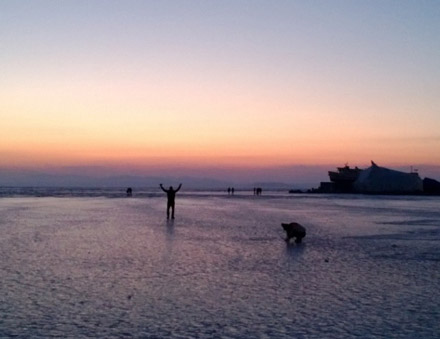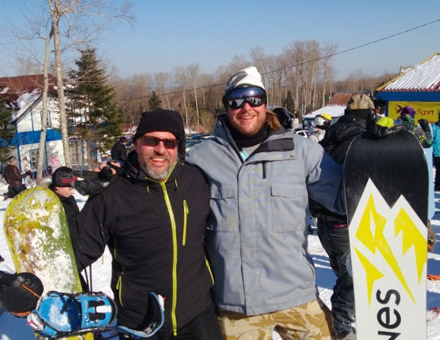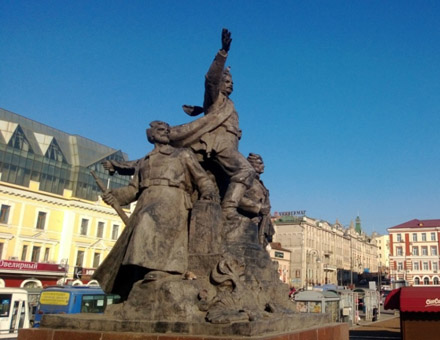
Looking out of the window of our hotel room, I can see the sunrise over the Amur River, one of Siberia's major rivers, and on the other side – China! It is day 90 of our journey from Africa to Brazil and we are in Blagoveshchensk where the fabled Amur forms the border between Russia and China. To avoid illegal border crossings, both Russia and China have put up makeshift border posts on the frozen surface of the river, barely 50 meters apart from each other. These border posts eyeing each other seem to symbolize a clash of the Super-Powers, also manifested in the architecture on both sides of the river - Chinese high rises on the one side, colorfully lit at night, form a striking contrast to the beautiful Tsarist era turn of the 19th century buildings on the Russian side.
Two days later, we reach Khabarovsk – less than 1,000km to go Vladivostok on the Pacific Ocean! The thermometer in Khabarovsk's main square shows -7°C. After weeks of arctic temperatures, this feels comfortably warm and for the first time in a month, I am wearing less than four layers of clothes to protect me from the cold. It is a bright sunny afternoon, and the streets are buzzing with local people who seem to enjoy the first warmer rays of the sun just as much as we do. Khabarovsk's charming city center boasts impressive cathedrals with golden cupolas and the streets are lined by century-old buildings. The creative ice sculptures in its central park attract many families and the joyful screams of the kids as they chase each other down the ice slides are echoed by the laughter of the teenagers who are skateboarding on a small ice-free part of the main square, right in front of the huge Lenin statue.
When I arrive back at the hotel, I meet my travel companion Alec and tell him what happened. Reliving the experience makes me realize how lucky I have been – my guardian angel has been on duty again and I feel grateful to be alive. Later this evening, we explore Khabarovsk's clubs which are famed as the best east of the Urals. At a club called "Hospital", scantily clad dancers gyrate – however, they fail to impress me, I am so exhausted that after a short while I fall asleep in spite of the ear splitting techno tunes.
 Early next morning, we head out on our last leg to the Pacific Ocean. Our aim is to reach Vladivostok today but 50km outside Khabarovsk we see what looks like ski slopes on a nearby mountain. We have been looking forward to skiing and snowboarding in Russia but so far haven't had the opportunity to do so except on the frozen surface of Lake Baikal. Therefore, we spontaneously decide to drive towards the mountain and are thrilled when at its base we indeed find an ancient ski lift and a buzzing atmosphere, with skiers and snowboarders of all ages enjoying the snow. A sign with Cyrillic letters tells us that we are in "Spartak Ski Resort" and for the next couple of hours, we join the locals in snowboarding down the steep runs of the mountain, a wonderful experience!
Early next morning, we head out on our last leg to the Pacific Ocean. Our aim is to reach Vladivostok today but 50km outside Khabarovsk we see what looks like ski slopes on a nearby mountain. We have been looking forward to skiing and snowboarding in Russia but so far haven't had the opportunity to do so except on the frozen surface of Lake Baikal. Therefore, we spontaneously decide to drive towards the mountain and are thrilled when at its base we indeed find an ancient ski lift and a buzzing atmosphere, with skiers and snowboarders of all ages enjoying the snow. A sign with Cyrillic letters tells us that we are in "Spartak Ski Resort" and for the next couple of hours, we join the locals in snowboarding down the steep runs of the mountain, a wonderful experience!
When we continue our journey, exhausted but excited about the unexpected joy of snowboarding, we only have three hours of daylight left and it is clear that we won't make it to Vladivostok today. According to our map, half way to Vladivostok there is a town called Spassk-Dalnyi, so we make this our goal for today. At 10pm, we finally reach Spassk-Dalnyi and within a couple of minutes we feel transported back to Soviet Union times. The dark streets are lined by run-down pre-fabricated apartment blocks and the central square is dominated by a gruesome statue of heroic Red Army soldiers. The first person we ask for advice on where to stay for the night offers to show us the way but we realize that he is completely drunk and decline his offer with thanks. The receptionist in the run-down hotel appears to compete for the title of "unfriendliest and least co-operative hotel employee of the year". We have to ask her three times to show us a room and in spite of the hotel being completely empty and us obviously being friends travelling together, she offers us an overpriced suite with a king size bed. It takes another three requests until she agrees to let us stay in a much lower priced but far more appropriate twin room. When we dare to ask where we can get money to pay for the hotel at this time of the night, she sighs with obvious disgust and growls at us that this is not really her but rather our problem. After finally finding an ATM in town that is kind enough to dispense money and having been allowed into our room, Alec and I look at each other and laugh in disbelief about this relic of socialist attitude.

With the sun shining gloriously from a deep blue sky, we reach Vladivostok the next afternoon – I feel exhilaration and a sense of triumph as we drive into the breathtakingly beautiful Golden Horn Bay. It has taken us 94 days and 23,000 km to get from Nairobi to Vladivostok - one day later than planned and just in time to catch the ferry to Japan which will depart in two days. We spend the afternoon exploring Vladivostok which with its steep hills and spectacular location is sometimes described as the San Francisco of Far East Russia. We are thrilled when we walk over the gigantic harbor bridge, with ice floating far below us. Just as the sun sets, we are reaching the other side of the bay where the Pacific Ocean is still frozen. A beautiful ambiance surrounds us as hundreds of people take an afternoon stroll across the frozen sea. After my scary experience on the Amur River, I debate with myself for a couple of minutes whether to join them – but my joy of being here finally prevails over my anxiety and with jubilation in my heart I walk across the ice into the sunset, grateful for the wonderful journey up to this point and full of expectations of what lies ahead.

